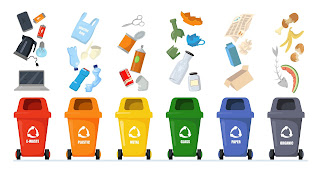10 Surprising Recycling Facts You Need to Know
- Get link
- X
- Other Apps
Recycling is more than just a buzzword—it’s a powerful way to reduce waste, save resources, and protect our planet. However, there’s more to recycling than tossing cans and bottles into a bin. Here are 10 amazing facts about recycling that highlight its importance and impact on our environment.
1. Recycling One Aluminum Can Saves Enough Energy to Power a TV for 3 Hours
Aluminum recycling is incredibly energy-efficient. By recycling one can, you save about 95% of the energy required to create a new one from raw materials.
2. Plastic Takes Over 400 Years to Decompose
Most plastics don’t biodegrade. Recycling plastic reduces the demand for new materials and prevents it from filling up landfills or polluting oceans.
3. Glass Can Be Recycled Indefinitely
Unlike many other materials, glass doesn’t degrade in quality when recycled. A single glass bottle can be recycled endlessly without losing its integrity.
4. Recycling Creates Jobs
Did you know the recycling industry supports more than 750,000 jobs in the United States alone? This includes collection, processing, and manufacturing roles.
5. 75% of Waste is Recyclable, But Only 30% is Actually Recycled
A large portion of our trash could be recycled, but much of it ends up in landfills due to lack of awareness or proper facilities.
6. Recycling Paper Saves Trees and Water
Recycling one ton of paper saves about 17 trees and 7,000 gallons of water. With global deforestation on the rise, this is a crucial step toward sustainability.
7. Electronic Waste is the Fastest Growing Waste Stream
E-waste includes old phones, laptops, and other electronics. Recycling them properly ensures valuable materials like gold, silver, and copper are recovered and reused.
8. Recycling Reduces Greenhouse Gas Emissions
Producing new materials often requires fossil fuels. Recycling reduces the need for new production, cutting greenhouse gas emissions and slowing climate change.
9. Recycling One Ton of Steel Saves 2,500 Pounds of Iron Ore
Steel is one of the most recycled materials globally. Every ton recycled reduces the need for raw material extraction and conserves natural resources.
10. Composting is Recycling Too
Food scraps and yard waste make up about 30% of what we throw away, but they can be composted instead of sent to landfills. Composting enriches soil and reduces methane emissions from organic waste.
Why Recycling Matters
Recycling isn't just about reducing waste—it's about conserving energy, preserving resources, and creating a cleaner, healthier planet for future generations. By learning these recycling facts, you can make more informed decisions about your waste and contribute to a sustainable future.
How You Can Help
- Know What’s Recyclable: Check your local guidelines to avoid contaminating recycling bins.
- Reduce First: Recycling is great, but reducing waste and reusing items are even better.
- Spread Awareness: Share these recycling facts with friends and family to inspire action.
Let’s work together to make recycling a part of our everyday lives. Small steps lead to big changes!
- Get link
- X
- Other Apps
.jpg)


Comments
Post a Comment